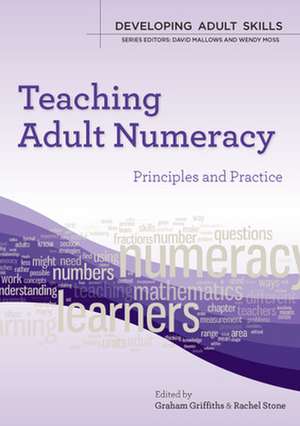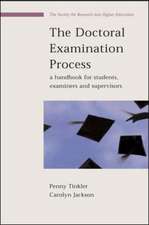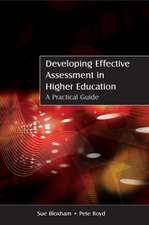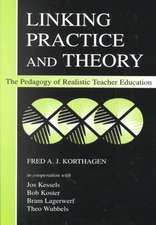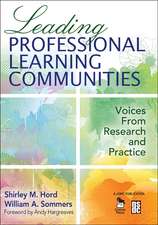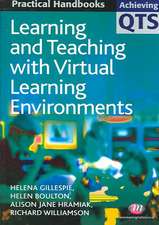Teaching Adult Numeracy: Principles and Practice
Autor Graham Griffiths, Rachel Stoneen Limba Engleză Paperback – 16 aug 2013
- Reviews of existing policy and research and implications for practice
- Reflective tasks with commentary, encouraging you to develop and apply your knowledge
- Case studies of real student experiences
- Practical activities and ideas to support the planning, teaching and assessment of adult numeracy
"This is a quite unique book about teaching adult numeracy, which will be invaluable to the many practitioners in this field. The chapters, contributed by a group of experienced and successful lecturers and practitioners, include all aspects of this field, from methods of teaching specific mathematical topics to more general explorations of dyscalculia and emotional factors in adult learners. Each chapter includes research findings and thoughtful presentation of ideas with practical ideas for teaching, and tasks for the reader. This is a market which has not been served well in the past, so it is good to see the gap filled at last."
Margaret Brown, Emeritus Professor of Mathematics Education, King's College London, UK
"The editors of this book set out to produce a text that would support teacher-education programmes for adult numeracy, and their book does that and more. The content covers different types of learners, different settings, different understandings of what numeracy actually is; and ranges from commentary on research through case studies to "how to" hints and tips for teaching. Chapters 7 (on provoking mathematical thinking) and 8 (attitudes, beliefs and teaching) should be a required read for any adult numeracy teacher. The book would be at home on any numeracy teacher's desk, and would make an excellent set text for numeracy teacher training courses."
Carol Randall, course co-ordinator for numeracy in the department of Lifelong Learning Teacher Education, University of Greenwich, UK
"This book is a welcome addition to the growing literature on adult numeracy. It should be essential reading for trainee and practising adult numeracy educators. It brings together relevant research and professional wisdom on a wide variety of aspects of adult numeracy teaching and learning in an accessible way, with well-focussed tasks for readers to extend their knowledge and understanding. While the book is born out of UK concerns and issues, it is also relevant to international readers. Highly recommended."
Professor Diana Coben PhD, Director, National Centre of Literacy & Numeracy for Adults, University of Waikato, New Zealand, and Hon. Trustee, Adults Learning Mathematics - A Research Forum (ALM -- www.alm-online.net/)
Preț: 287.88 lei
Nou
Puncte Express: 432
Preț estimativ în valută:
55.09€ • 57.31$ • 45.48£
55.09€ • 57.31$ • 45.48£
Carte tipărită la comandă
Livrare economică 15-29 aprilie
Preluare comenzi: 021 569.72.76
Specificații
ISBN-13: 9780335246823
ISBN-10: 0335246826
Pagini: 336
Ilustrații: black & white illustrations
Dimensiuni: 170 x 240 x 15 mm
Greutate: 0.53 kg
Ediția:New.
Editura: McGraw Hill Education
Colecția Open University Press
Locul publicării:United Kingdom
ISBN-10: 0335246826
Pagini: 336
Ilustrații: black & white illustrations
Dimensiuni: 170 x 240 x 15 mm
Greutate: 0.53 kg
Ediția:New.
Editura: McGraw Hill Education
Colecția Open University Press
Locul publicării:United Kingdom
Cuprins
IntroductionSection One: Numeracy and society
The social context of numeracy
Why and where adult numeracy teaching and learning takes place
Adult numeracy learners
Section Two: Understanding Numeracy
Mathematics and numeracy
Language and mathematics
Teachers and the process of mathematical thinking
Provoking mathematical thinking: numeracy teachers doing 'realistic' maths
Attitudes, beliefs and teaching
Section Three: Teaching and learning numeracy
Approaches to teaching adult numeracy
Planning for numeracy learning
Assessment
Teaching number, measure and data
Section Four: Contexts for teaching and learning numeracy
Family mathematics
Developing numeracy skills in vocational contexts: learning for and in the workplace
Section Five: Numeracy and inclusive learning
Dyslexia, dyscalculia and numeracy
Mental health and the emotional aspects of learning mathematics
References
The social context of numeracy
Why and where adult numeracy teaching and learning takes place
Adult numeracy learners
Section Two: Understanding Numeracy
Mathematics and numeracy
Language and mathematics
Teachers and the process of mathematical thinking
Provoking mathematical thinking: numeracy teachers doing 'realistic' maths
Attitudes, beliefs and teaching
Section Three: Teaching and learning numeracy
Approaches to teaching adult numeracy
Planning for numeracy learning
Assessment
Teaching number, measure and data
Section Four: Contexts for teaching and learning numeracy
Family mathematics
Developing numeracy skills in vocational contexts: learning for and in the workplace
Section Five: Numeracy and inclusive learning
Dyslexia, dyscalculia and numeracy
Mental health and the emotional aspects of learning mathematics
References
